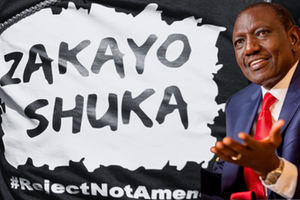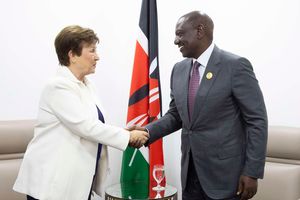
Deputy President William Ruto with members of the creative industry discussing their concerns, receive suggestions and proposals on the current situation in the country at his Karen office, Nairobi.
In December 2022, a headline of a story in the Business Daily read, “Campaigning in poetry, governing in prose: Ruto's 100 days in office.”
Depending on whom you asked, reactions to President William Ruto’s early performance were mixed, though many leaned toward disappointment. Still, some argued that 100 days was too little time to judge a man who campaigned as a champion of the downtrodden and a friend to creatives.
During his presidential campaigns, Mr Ruto courted artistes with grand promises, catchy slogans like “pesa mfukoni” and “Nikiweka Biblia tu chini hivi…”, and held forums with hundreds of creatives to hear their grievances.
During his presidential campaigns, Mr Ruto courted artistes with grand promises and catchy slogans.
Now, as his administration hits the 1,000th day in office on June 9, questions linger over what has materialised.
Mr Ruto pledged a revolution in the creative economy — which contributes 5.3 percent to Kenya’s GDP — through policies such as a Creative Economy Bill, a National Film Fund, tax incentives for filmmakers, the construction of cultural infrastructure like theatres and galleries, and the promotion of entrepreneurship in music.
For the film industry, he also made bold promises.
“We will review the inter-county licensing regime to develop a single permit. We will establish a green channel immigration scheme and protocol service for international filmmakers. We will also benchmark competing film destinations for international filmmakers in Africa and offer,” pledged the president in September 2022.
Do artistes feel hisactual on-the-ground impactor disappointment?
Jennifer Ochieng, a film publicist, critic and founder of Sinema Focus, says that not much has happened under Ruto's leadership.
In her view, Kenya’s film, TV and theatre industry remains one of the most under-explored and under-leveraged sectors.
Despite generating a value of Sh86.9 billion and a gross value added (GVA) of Sh38.1 billion in 2022, according to the 2023 Film Satellite Industry Account (Fisa) report by the Kenya Film Commission (KFC) and the Kenya National Bureau of Statistics (KNBS), the industry continues to operate without proper structures, policies or infrastructure needed to support consistent, scalable growth.
“In 2024, the government announced that it would offer tax incentives to US-based Invention Studios in an attempt to promote Kenya as a preferred destination for Hollywood productions. While such efforts are laudable, what about incentives for local filmmakers? This is a key issue for local productions and has hindered the industry's growth. South Africa, on the other hand, has seen deliberate government efforts and tax policies that have positioned the country as a continental and global production hub for major studios,” argues Ms Ochieng’.

President William Ruto, First lady Rachel Ruto and Education CS Julius Ogamba winners of the 63rd Kenya National Drama And Film Festival 2025 were hosted for a State Concert at the State House, Nakuru, on April 16, 2025.
She adds: “You cannot grow an industry without actionable solutions to real problems. What is clear is that the government does not seem to know what to do with the creative economy sector. Nothing illustrates this better than the constant reshuffling of this portfolio [the Cabinet Secretary of Youth Affairs, Sports and the Arts] from Ababu Namwamba to Kipchumba Murkomen and now Salim Mvurya. Who knows who will be next?"
Ms Ochieng' opines that there was some progress under Mr Namwamba until he was moved.
“Namwamba inspired confidence and hope that things were finally going in the right direction. He spearheaded high-profile partnerships, such as the aforementioned Hollywood deal. He pushed for the National Film Fund to facilitate tax rebates, policy reforms, and incentives such as a 15 percent reduction in the licensing fee. However, those initiatives stalled with his exit. What we have seen as with many sectors under Ruto’s government, is lip service, but not enough action or solutions to the persistent policy and infrastructure issues," she says.
Talanta Hela fuss
Roy Gitahi, a creative business executive and founder of Art at Work and Wabuni Sacco, which supports income generation for creatives, agrees with Ms Ochieng's sentiments. He believes the government’s involvement in the creative sector has lacked focus and effectiveness.
“This administration talks about a lot of things. It's confusing as to whether it's in the public or private sector. The government's role is to create an enabling environment for the private sector to thrive. Why is this administration taking over private sector functions? It's because the beneficiaries are within the government,"says Mr Gitahi.
"Former President Uhuru Kenyatta had a better understanding of our sector. He established the Creative Economy Taskforce through Gazette Notice 6619. This task force was formed as a result of research showing that the Kenyan creative economy was very informal and needed to be formalised. It needed to deal with entities, not individuals, as has been the case for years. That’s how you grow a sustainable business. Financial institutions don't work with individuals, so they don't work with you. This is why, to date, Kenyan creatives cannot walk into a bank and get a loan using their art as security, no matter how famous they are. This is why they live hand to mouth, pay cheque to pay cheque.”
He goes on: “Another role of the taskforce was to develop capacity-building strategies. Most Kenyan creatives don't know how to run a business. You'll immediately know when a creative gets the money. They will show off with a new car, the latest fashion trends and trips. Most don't know how to invest, and we have seen them go bankrupt.
"The taskforce was also set up to provide business management support to help the creatives continue doing their craft and generating income. When Ruto came in, the task force was replaced by Talanta Hela, and who sits on it? Celebrities. Now, tell me, when you ask them to resolve issues of financial inclusion, which of them will do so? None of the people on Talanta Hela have any knowledge of finance; they aren't technocrats. All they bring to the table is their celebrity status. That's what Ruto's government is doing to the sector.”
Mr Gitahi finds Mr Ruto’s track record in the film industry promises disappointing and unconvincing.
“He promised many things about improving the film industry. I remember asking the CEO of the Kenya Film Commission how many $1 million (Sh128 million) movies Kenya could produce in a year, and he said only one. Yet this is a country that can do better. We have enough talent, but the challenges are logistics, equipment and prohibitive licenses,” says Mr Gitahi.
Skiza Tunes revenues
David Katee, an entertainment lawyer, singles out the Skiza Tunes platform as an area where the government could have acted quickly but has not.
Skiza Tunes, a Safaricom service offering customisable ringtones, is one of the country's highest music royalty generators.
In 2016, Safaricom announced it had paid Sh152 million to collective management organisations (CMOs) and premium rate service providers (PRSPs), also known as music aggregators, to distribute to artistes whose music is sold through the Skiza platform.
“The amendment to the Copyright Act, which took place during Mr Kenyatta's time, should have been implemented. The Act stated that telecoms should pay Skiza Tunes directly to artistes. Implementing this would eliminate the need for middlemen, such as CMOs and music aggregators, who have been a nuisance to artistes' royalty revenue. With the Act in place, what is stopping Mr Ruto from instructing Safaricom to do so? The government is the largest Safaricom shareholder. And this is just not Safaricom, the law applies to all telco companies with callback tunes services,” says Mr Katee.
The lawyer argues that doing away with the CMOs and the music aggregators will allow artistes to earn more revenue from their royalties.
“The situation has always been these middlemen sign the artistes then provide their songs to the telcos then these companies when paying they pay these middlemen who then will deduct their administrative fees, the same is also taxed and what remains is sent to artistes. So there is a lot of deductions in between that’s hurting the artistes.”
Content monetisation
Not all feedback is negative. Eddie Butita, a comedian, believes that Ruto’s administration has done so much to unlock the creative economy's potential, as opposed to his predecessor.
“I would give President Ruto credit for unlocking content monetisation, especially for content creators. The president has sparked creative economy conversation in high-level spaces that we couldn’t have reached. All these US-Kenya Creative Forums that you keep seeing happening as a result of that. They say mgara muwe lakini haki yake mpe (give credit where it's due). You might remember I was part of the entourage that went to the US with the president; many of these talks happened then.

Comedian Eddie Butita.
"For years, there was talk about persuading Meta [formerly Facebook] to open up content monetisation in Kenya. It took the president a few calls to make it bring Meta to the table, and now content creators can monetise their work on Meta platforms. Partnerships between the government and companies such as Meta, and Google have happened under him, which have made content creation an opportunity for many creators to make a living,” says Mr Butita.
However, the funnyman feels the administration has failed to improve the film industry.
“For instance, recently, I started pushing for a simple conversation. I wanted to find out why screening foreign movies in Kenyan cinemas costs Sh800 per seat, but screening a local film costs Sh1,000, forcing me to charge customers between Sh1,500 and Sh2,000. Why are we being given a raw deal? How can we encourage the consumption of our content?" he argues.
"This is a policy issue that the government can address by sitting down with cinema owners and resolving it. If it’s a tax issue, the government can offer incentives or rebates so that we can have many local films showing in cinemas without making it look like we are shafting our fans," he adds.
Roy Kanyi, a tech creator, agrees with Mr Butita.
“When it comes to sparking conversations about content creation at high levels, I think President Ruto has been the most vocal about it. I can't think of anyone else in Kenya at that high level who started the discussion about monetising content other than him. He pushed for TikTok to start monetising in Kenya, which is what all Kenyan creatives wanted. We saw him meet with TikTok executives, and now there are TikTok adverts in Kenya, which didn't exist before. We have also seen a lot of collaboration amongst creatives on that platform. He also pushed for Meta monetisation to come to Kenya, and it's working, even if it's not generating much money. Still, that was a good start. To be honest, when Ruto started talking about content creation, even those who were opposed, like our parents, began to take it seriously. Through content creation, I have been able to employ a manager, an editor all of whom I pay a monthly salary,” he says.
Although Mr Kanyi is pleased with Mr Ruto's support for content creation, he is dissatisfied with the implementation process.
“That's the downside of his efforts. Implementing some of these things he has been good at pushing has been super slow. There is also a lack of infrastructure. Abel Mutua [ascreenwriter, actor, filmmaker and digital storyteller] has complained about the lack of a state-of-the-art amphitheater and indoor arenas where creatives can showcase their content, which would generate revenue for both artists and the government. We don't have such facilities in the capital, yet we are said to have the biggest economy in the region. This is something he should have commissioned a long time ago,” says Mr Kanyi.
See some of our other Ruto@1,000 coverage below:








